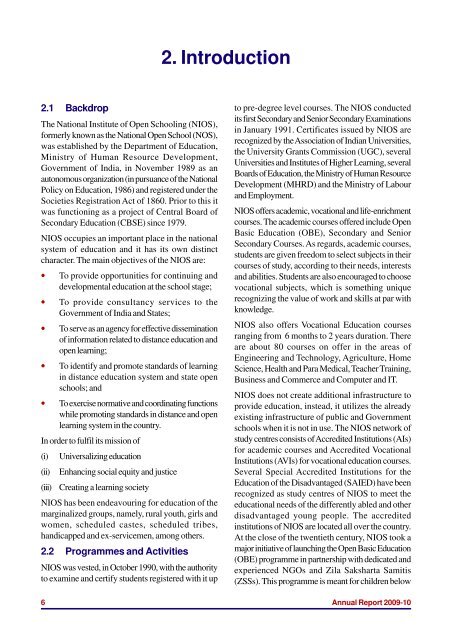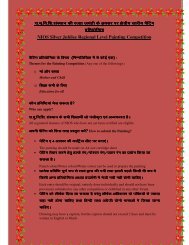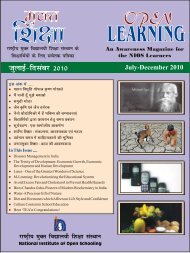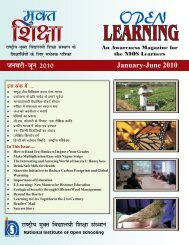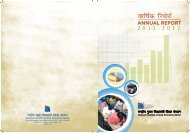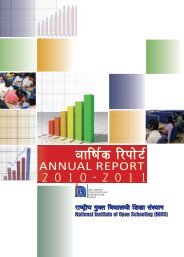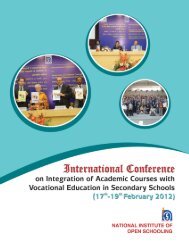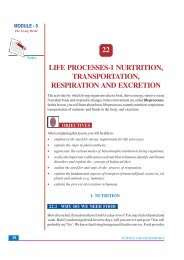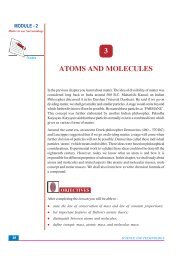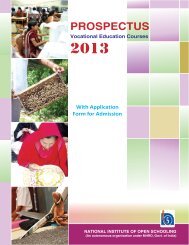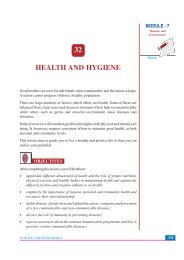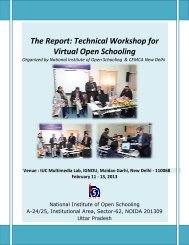2009-10 (16.6 MB) - The National Institute of Open Schooling
2009-10 (16.6 MB) - The National Institute of Open Schooling
2009-10 (16.6 MB) - The National Institute of Open Schooling
Create successful ePaper yourself
Turn your PDF publications into a flip-book with our unique Google optimized e-Paper software.
<strong>National</strong> <strong>Institute</strong> <strong>of</strong> <strong>Open</strong> <strong>Schooling</strong><br />
2. Introduction<br />
2.1 Backdrop<br />
<strong>The</strong> <strong>National</strong> <strong>Institute</strong> <strong>of</strong> <strong>Open</strong> <strong>Schooling</strong> (NIOS),<br />
formerly known as the <strong>National</strong> <strong>Open</strong> School (NOS),<br />
was established by the Department <strong>of</strong> Education,<br />
Ministry <strong>of</strong> Human Resource Development,<br />
Government <strong>of</strong> India, in November 1989 as an<br />
autonomous organization (in pursuance <strong>of</strong> the <strong>National</strong><br />
Policy on Education, 1986) and registered under the<br />
Societies Registration Act <strong>of</strong> 1860. Prior to this it<br />
was functioning as a project <strong>of</strong> Central Board <strong>of</strong><br />
Secondary Education (CBSE) since 1979.<br />
NIOS occupies an important place in the national<br />
system <strong>of</strong> education and it has its own distinct<br />
character. <strong>The</strong> main objectives <strong>of</strong> the NIOS are:<br />
• To provide opportunities for continuing and<br />
developmental education at the school stage;<br />
• To provide consultancy services to the<br />
Government <strong>of</strong> India and States;<br />
• To serve as an agency for effective dissemination<br />
<strong>of</strong> information related to distance education and<br />
open learning;<br />
• To identify and promote standards <strong>of</strong> learning<br />
in distance education system and state open<br />
schools; and<br />
• To exercise normative and coordinating functions<br />
while promoting standards in distance and open<br />
learning system in the country.<br />
In order to fulfil its mission <strong>of</strong><br />
(i)<br />
(ii)<br />
(iii)<br />
Universalizing education<br />
Enhancing social equity and justice<br />
Creating a learning society<br />
NIOS has been endeavouring for education <strong>of</strong> the<br />
marginalized groups, namely, rural youth, girls and<br />
women, scheduled castes, scheduled tribes,<br />
handicapped and ex-servicemen, among others.<br />
2.2 Programmes and Activities<br />
NIOS was vested, in October 1990, with the authority<br />
to examine and certify students registered with it up<br />
to pre-degree level courses. <strong>The</strong> NIOS conducted<br />
its first Secondary and Senior Secondary Examinations<br />
in January 1991. Certificates issued by NIOS are<br />
recognized by the Association <strong>of</strong> Indian Universities,<br />
the University Grants Commission (UGC), several<br />
Universities and <strong>Institute</strong>s <strong>of</strong> Higher Learning, several<br />
Boards <strong>of</strong> Education, the Ministry <strong>of</strong> Human Resource<br />
Development (MHRD) and the Ministry <strong>of</strong> Labour<br />
and Employment.<br />
NIOS <strong>of</strong>fers academic, vocational and life-enrichment<br />
courses. <strong>The</strong> academic courses <strong>of</strong>fered include <strong>Open</strong><br />
Basic Education (OBE), Secondary and Senior<br />
Secondary Courses. As regards, academic courses,<br />
students are given freedom to select subjects in their<br />
courses <strong>of</strong> study, according to their needs, interests<br />
and abilities. Students are also encouraged to choose<br />
vocational subjects, which is something unique<br />
recognizing the value <strong>of</strong> work and skills at par with<br />
knowledge.<br />
NIOS also <strong>of</strong>fers Vocational Education courses<br />
ranging from 6 months to 2 years duration. <strong>The</strong>re<br />
are about 80 courses on <strong>of</strong>fer in the areas <strong>of</strong><br />
Engineering and Technology, Agriculture, Home<br />
Science, Health and Para Medical, Teacher Training,<br />
Business and Commerce and Computer and IT.<br />
NIOS does not create additional infrastructure to<br />
provide education, instead, it utilizes the already<br />
existing infrastructure <strong>of</strong> public and Government<br />
schools when it is not in use. <strong>The</strong> NIOS network <strong>of</strong><br />
study centres consists <strong>of</strong> Accredited Institutions (AIs)<br />
for academic courses and Accredited Vocational<br />
Institutions (AVIs) for vocational education courses.<br />
Several Special Accredited Institutions for the<br />
Education <strong>of</strong> the Disadvantaged (SAIED) have been<br />
recognized as study centres <strong>of</strong> NIOS to meet the<br />
educational needs <strong>of</strong> the differently abled and other<br />
disadvantaged young people. <strong>The</strong> accredited<br />
institutions <strong>of</strong> NIOS are located all over the country.<br />
At the close <strong>of</strong> the twentieth century, NIOS took a<br />
major initiative <strong>of</strong> launching the <strong>Open</strong> Basic Education<br />
(OBE) programme in partnership with dedicated and<br />
experienced NGOs and Zila Saksharta Samitis<br />
(ZSSs). This programme is meant for children below<br />
6 Annual Report <strong>2009</strong>-<strong>10</strong>


